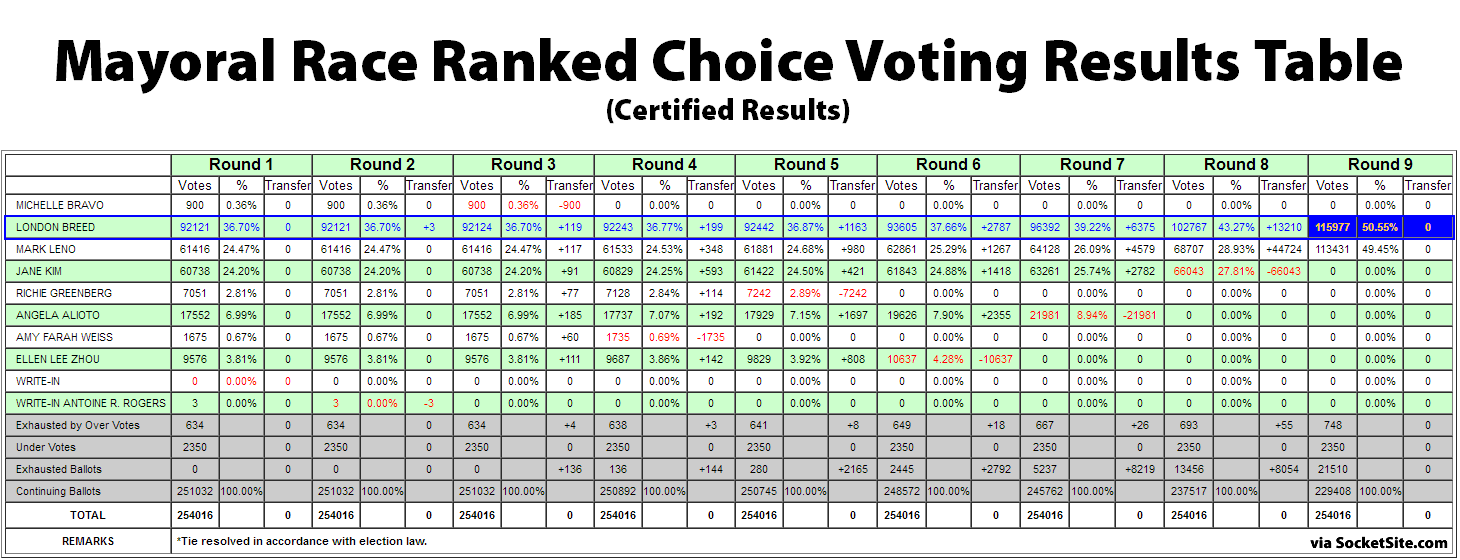San Francisco’s Department of Elections has just finished their final review of the 253,583 ballot cast in the June 5 election and certified the election results.
With 481,991 registered voters in San Francisco, the final effective turnout was an above average 52.61 percent. And while we had projected London Breed would win the mayoral race by a margin of around 2,100 votes, or 0.83 percent of all ranked choice ballots cast, when we first declared her victory, the final margin was actually 2,546 (1.00 percent).
The final accounting for the ranked-choice vote results are outlined in the table above, with London Breed securing 50.55 percent of the final tally versus 49.45 percent for Mark Leno.
Note that 8,219 ballots were “exhausted” (either by having not indicated a second or third choice vote or having already exhausted all three choices) when Angela Alioto was eliminated and another 8,054 ballots were “exhausted” following Jane Kim’s exit. Once again, Breed’s margin of victory was a total of 2,546 votes.
And with respect to the final count of first choice, non-ranked, votes, the top six vote getters were as follows:
1. London Breed 91,918 (36.64% of first choice votes)
2. Mark Leno 61,276 (24.43%)
3. Jane Kim 60,644 (24.17%)
4. Angela Alioto 17,447 (6.95%)
5. Ellen Lee Zhou 9,521 (3.80%)
6. Richie Greenberg 7,016 (2.80%)

Better still to publish would be the block by block voter data that would clearly illustrate where sketchy “political machine” voting practices predominated. Too many people in San Francisco “vote as they are told to” for candidates they know nothing about and care nothing about.
You could say that about literally any election.
In summary SF residents voted >50% for moderate candidates.
I like the way this city is heading. Perhaps the Chronicle can catch on and hear we are tried of the ‘old progressive’ nonsense.
San Francisco almost always votes for the more moderate candidate for mayor. Its when voting for members of the Board of Supervisors that The City (or at least a majority of the districts) swing to the left.
I like this rank choice voting system.
Looks like Kim voters put Breed over the top, ironically. Greenberg and Alioto voters went for Leno/Kim by net 1,224 votes over Breed. If Leno had clawed back just a bit more of Kim’s voters he would have been home free.
Any theories as to why the Alioto/Greenberg voters broke for the progressive candidates over Breed? I can’t figure that one.
That’s a strange read.
While Leno only captured 13.5 percent (980) of Greenberg’s votes and 20.8 percent (4,579) of Alioto’s, as compared to the 16.1 percent (1,163) and 29.0 percent (6,375) captured by Breed, respectively, Leno captured 67.7 percent (44,724) of Kim’s votes versus 20 percent (13,210) for Breed.
I believe Richard is referring to how many votes Leno AND Kim got from Greenberg and Alioto’s pool relative to Breed.
Richard, there are lots of possible reasons why a given voter could have gone from Allioto and/or Greenberg to Leno or Kim over Breed, just as there are lots of different reasons why 20% of Kim’s pool went to Breed.
Some of Allioto and Greensberg voters probably went to Leno because they didn’t want to vote for a black woman, some of Kim’s voters probably went to breed because they didn’t want to vote for a white guy (or even any guy), some Greensburg voters probably went to Leno because he was a guy, some voters were probably turned off of a particular candidate for whatever reason.
Exactly; there are lots of nuances in the way people vote and the Moderate vs. Progressive divide is not as strong in as many peoples’ minds as it is in the minds of political analysts.
Thanks to both of you for those thoughts, they are insightful. I like RCV as it gives some insight into voters’ myriad preferences beyond the binary ideological stuff.